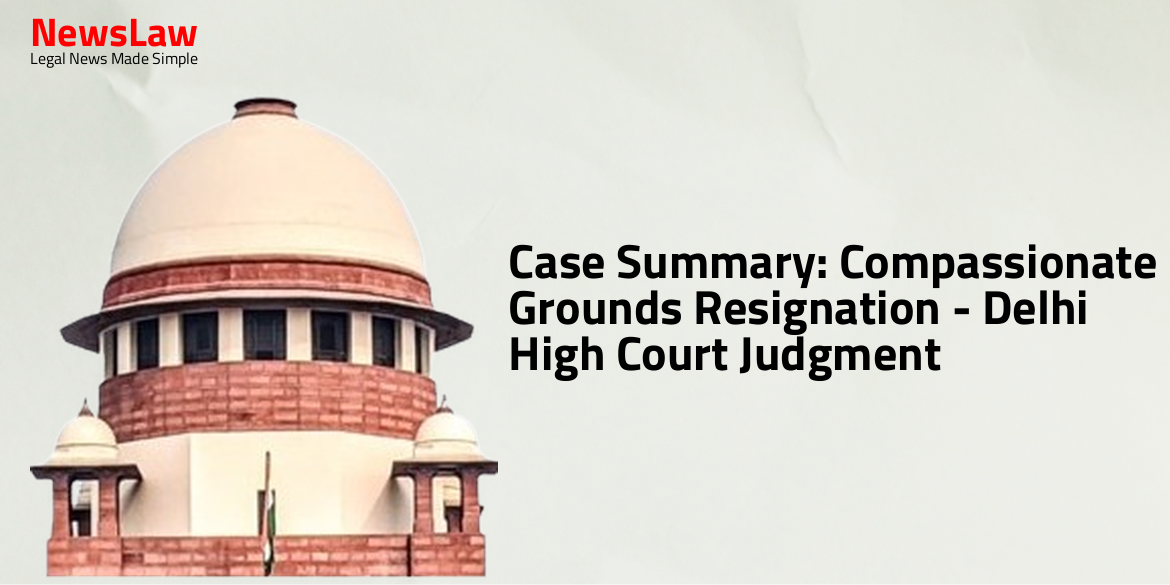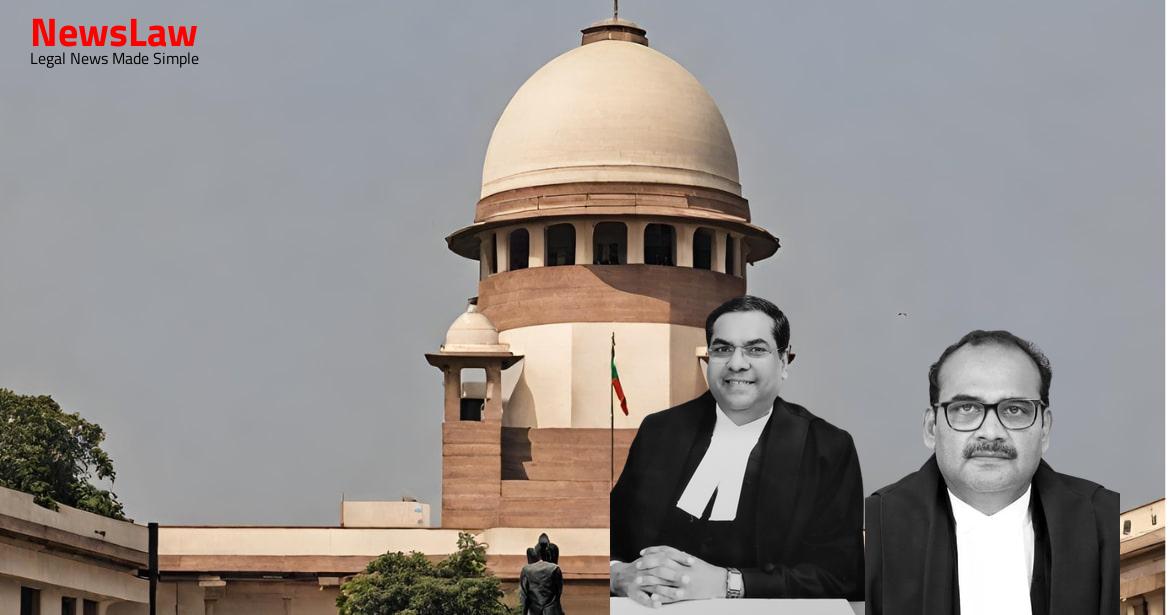The recent judgment by the Delhi High Court regarding a case on compassionate grounds resignation sheds light on crucial aspects of the law. The case involves a petitioner seeking resignation based on compassionate grounds, and the respondent evaluating the request in light of service exigencies. Explore this detailed summary of the legal proceedings for valuable insights. #DelhiHighCourt #CompassionateGrounds #LegalCase
Facts
- The petition was disposed of by the Court on 11.08.2023, with specific directions.
- The direction includes reconsidering the case of the petitioner in accordance with Section 9 of the Coast Guard Act, 1978, Rules 27 and Rule 27A of the Indian Coast Guard (General Rules) 1986, and relevant judgments.
- The application of the Office Memorandum dated 23.12.2013 mentioned by the petitioner should also be reviewed for applicability.
- The respondents are instructed to make a decision promptly within four weeks, considering the petitioner’s existing appointment and the urgency of the matter.
Arguments
- The Petitioner has a fundamental right under Article 19 (1) (g) to choose his place of employment.
- The case of Major Rahul Shukla (supra) was relied upon, stating that even on the basis of exigency, the resignation could not have been rejected but should have been kept in abeyance.
- Several cases were cited in support of the Petitioner’s argument regarding the right to resign and choose employment, including CPL Sandeep Kumar vs UOI, CPL N.K. Jakhar Vs. UOI, Subhash Chand Vs. UOI, and Pradeep Kumar Vs. UOI & Anr.
- The rejection of the resignation based solely on an acute shortage of work force was contested, noting that other resignations were accepted without sufficient cause or reason.
- The Respondent argues that the Petitioner is mistaken in assuming he can leave employment at will due to fundamental rights under Section 19 (1) (g) as Article 33 of the Constitution restricts this right.
- The Respondent points out that the Petitioner misinterprets Government of India’s Office Memorandums and Circulars.
- Being a member of the Indian Coast Guard, the Petitioner is subject to the Coast Guard Act, 1978 according to the Respondent.
- It is emphasized that personnel in the Indian Coast Guard are crucial for national security and their resignation for outside jobs can harm the force and the nation.
- Section 4 of the Coast Guard Act designates the Coast Guard as an armed force of the Union.
Analysis
- Article 33 of the Constitution empowers Parliament to restrict or abrogate the rights conferred by Part III in their application to specific groups such as the Armed Forces.
- Members of the Armed Forces, Coast Guard, and related organizations have specific provisions for discharge, release, retirement, and resignation under relevant laws like the Coast Guard Act, 1978.
- The Central Government or designated authorities have the discretion to permit discharge, release, retirement, or resignation based on various grounds including extreme compassionate circumstances.
- The Coast Guard Policy Letter 018/2017 provides guidelines for the grant of NOC for job opportunities outside the Coast Guard.
- The acceptance of resignation or issuance of NOC for job outside the Coast Guard is at the discretion of the Central Government or designated authorities.
- The Petitioner, as a member of the Coast Guard, does not have an absolute right to resign or seek outside employment.
- Service exigencies like cadre position, promotional prospects, and impending induction of new assets are considered before granting NOC.
- Allowing trained personnel to resign at will could jeopardize national security and disrupt the service’s operational efficiency.
- The Coast Guard Act imposes restrictions on resignations to maintain discipline and ensure duties are properly discharged.
- Rules 27 and 27A of the Coast Guard (General) Rules, 1986 outline guidelines for granting NOC for job outside the Service based on various factors.
- The decision of the Competent Authority is based on service exigencies and does not warrant interference from the Court.
- Trained personnel leaving the service may create critical security gaps and impact the morale of remaining personnel.
- Significant investments in training personnel to meet service requirements are emphasized, indicating the seriousness of retaining trained workforce.
- The scheme prohibits resignations from the Coast Guard during the employment period unless specific conditions, like compassionate grounds, are met.
- The Apex Court emphasized the importance of strict discipline within the naval service.
- The purpose of restrictions in the naval service is to ensure the proper discharge of duties and maintenance of discipline.
- Members of the Armed Forces are governed by the rigour and discipline of the Force, as stated in a separate case.
- The concept of allowing a member of the Naval Force to leave service at will is against the high standards of discipline expected in the defense services.
- Enrolled members of the Air Force do not have an unqualified right to depart from service at their will during their engagement term.
- Article 33 of the Constitution empowers Parliament to restrict or abrogate certain provisions in their application to members of the Armed Forces.
- The interests of the service are paramount and must be balanced with situations where members seek civilian employment.
- Allowing sailors to claim release as of right during engagement would have disastrous consequences on national security.
- Sailors are entitled to seek discharge at the end of their engagement period, subject to exceptions provided in the Regulations.
- Maintaining the strength of the Naval Force through careful planning is crucial to ensure combat readiness in emergencies.
- Releasing trained sailors from service without discretion could adversely impact the efficiency and combat preparedness of the Naval Force.
- Rule 27 of the Coast Guard (General) Rules, 1986 allows for discharge, release, or retirement on extremely compassionate grounds.
- The Petitioner in this case cited his mother’s ovarian tumor and his son’s medical needs as reasons for seeking resignation on compassionate grounds.
- The Writ Petition was found to be devoid of merits, but the Court directed the Original Names to reconsider the Petitioner’s case sympathetically for acceptance of his resignation.
Decision
- The Petitioner is allowed to make a representation within two weeks from the date of the judgment.
- The representation should mention relevant circumstances and be supported by documents if available.
- The Respondents are directed to review and respond to the representation by a specified date, which is the 27th.
- The Petition is considered resolved and disposed of after this process.
Case Title: ABHISHEK MANOJ WARTHI Vs. UNION OF INDIA & ORS. (2024:DHC:4458-DB)
Case Number: W.P.(C)-12800/2023



